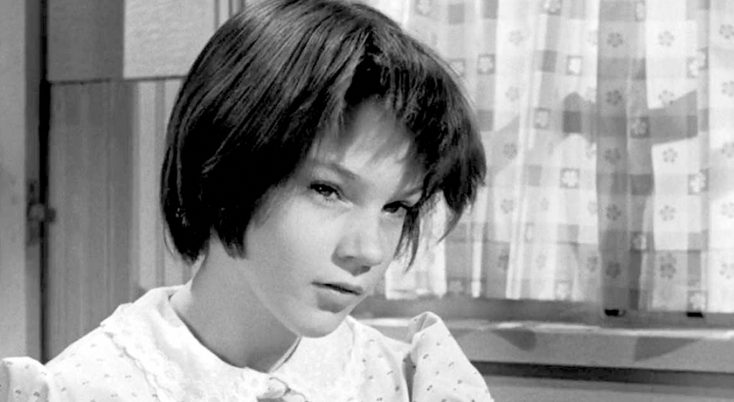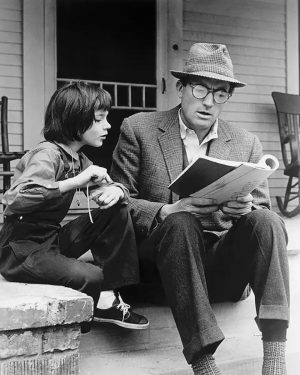By JUDY SLOANE
Front Row Features
HOLLYWOOD-Mary Badham was 9-years-old when she auditioned for the pivotal role of Scout in the movie version of Harper Lee’s “To Kill a Mockingbird,” which told the story of the relationship between a widower lawyer, Atticus Finch (Gregory Peck,) and his two children, Jem (Phillip Alford) and Scout.
Set during the depression, the movie highlighted the racial injustice that plagued the deep south, with Peck’s character, Atticus Finch, a man of integrity, agreeing to the overwhelming task of representing an innocent black man, Tom Robinson (Brock Peters,) who is accused of rape by a white woman.
The movie went on to receive eight Academy Award nominations, winning Gregory Peck an Oscar for Best Actor.
In April, 1994, I interviewed Mary Badham who at the time was working for the Red Cross as an instructor, teaching First Aid, CPR and child care. She spoke fondly of her relationship with Gregory Peck, who unfortunately passed away nine years later on June 12, 2003. This is part of my interview with Mary from 1994.
Judy Sloane: You’d never acted before you did “To Kill a Mockingbird” – how did you get the role of Scout?
Mary Badham: Boaty Boatright, who was the talent scout, was going all over the United States, and the story we got was that she got a call that there was a little girl in Birmingham, Alabama, that she needed to see, and whoever it was gave her my number. So my girlfriend and I, on a lark, went down. We thought, ‘No harm done,’ not thinking anything would come of it. Lo and behold, I got asked to go to New York for a screen test and I landed the part. I can’t help but feel there was a higher power involved in all of this. With the context of the film and the times that we were living in at that point, I think it was a film that had to be made.
Judy Sloane: At 9-years-old I’m sure you hadn’t read the book. Did they explain to you what the story was about?
Mary Badham: I’m sure we discussed it to a light extent. I don’t think we went into any detail, but I do remember my mother saying, ‘Do you have any problems with any of this? Is there something you want to ask me about?’ I understood the script as soon as I read it, because growing up in the south, at that period of time especially, you could not have been unaware of the word racism and know exactly what it meant.
Judy Sloane: What are your memories of working with Gregory Peck?
Mary Badham: He was every little girl’s dream of a father – kind, considerate, patient – a total delight to work with. He was very easy to play off of.
We correspond at Christmas and Father’s Day and if anything particular comes up we’ll call. Usually, once or twice a year, something comes up with the film where we need to get in touch with one another. Lately he’s been getting all these awards. He’s invited me a couple of times to those award banquets which has been lovely because we’ve be able to visit, and it’s quite a change for me which gets me out. It’s a lot of fun.
Judy Sloane: One of the iconic images in the movie is when your character rolls down a hill in a tire.
Mary Badham: I was never one of those kids that could do rides at the fair. I’ve always been very protective of myself, and I knew that the tire ride was something that my stomach would not be able to handle. So the way we did that was the first three rolls was me in the tire, so they could do the close-up of me getting into the tire, and a facial shot, and after that they had a double come in to do the rest of the trip.
Judy Sloane: What scene in the movie do you vividly remember shooting the most?
Mary Badham: The last scene in the picture that we shot was the courthouse steps scene where I had my long speech, and it was absolutely horrible for everyone involved. I knew it was the last day of shooting. I knew that I was going to have to say goodbye to all these wonderful people. I knew it was going to be all over and I didn’t want it to be over. For the first time I just could not get my lines right. I’d never had any trouble with my lines, but I couldn’t spit them out. At one point, we had to take a break and I could hear all the groaning and moaning, people saying, ‘Let’s go. We’ve got to get home.’ I ran into my dressing room and cried my eyes out for about 15 to 20 minutes. Finally, my mother said, ‘Look, enough is enough. Let’s get this done and get it over with. You’re a professional now. You cannot do this to these people, so dry your eyes and get out there and do your stuff.’
Judy Sloane: You were nominated for an Academy Award for Best Supporting Actress for your role as Scout. What do you remember about that night?
Mary Badham: I never in the world thought that I would win. I was absolutely terrified to go on the stage because I was totally unprepared. I thought Patty Duke totally deserved it for “The Miracle Worker.” She had worked so hard. For me, I was just out there having a good time. I can remember distinctly as we were going out of the theatre my mother was rather disappointed. She really thought I was going to win. I said, ‘That’s okay, Mom. There’s always next year.’ And she said, ‘Honey, there is no next year!’
Judy Sloane: Any last thoughts about the movie?
Mary Badham: I think everybody involved with that film was so special. All my memories are so warm. I’ve never worked on a film since then where the crew was so together, loving and honorable. It may sound silly to some people, but I feel it was one of God’s pictures, because look what was going on around us and how many subjects it addressed.
Note: On March 27, 2022, Mary Badham opened in the touring company of Aaron Sorkin’s stage adaptation of “To Kill a Mockingbird” playing the role of Mrs. Dubose. It starred Richard Thomas as Atticus Finch.
Portions of this interview were first published in Film Review Magazine






